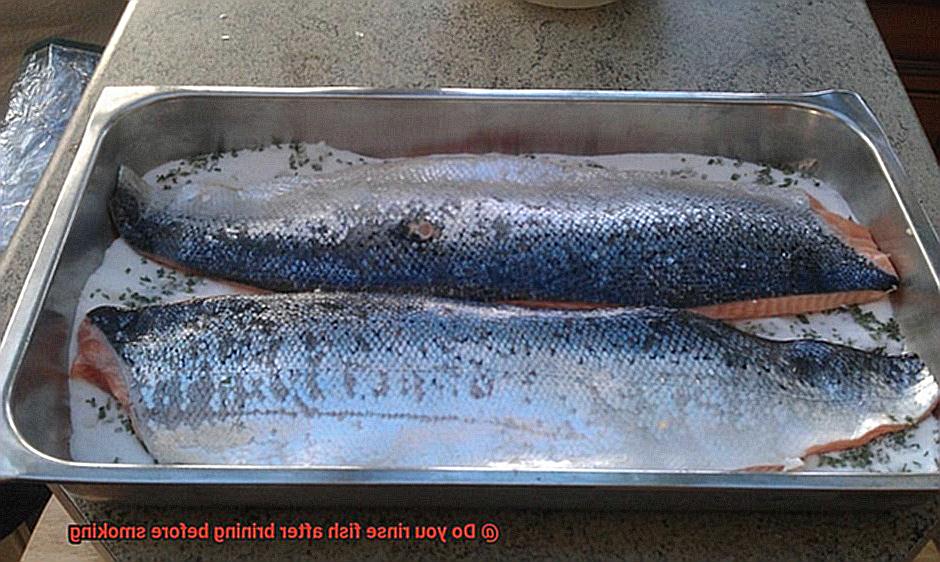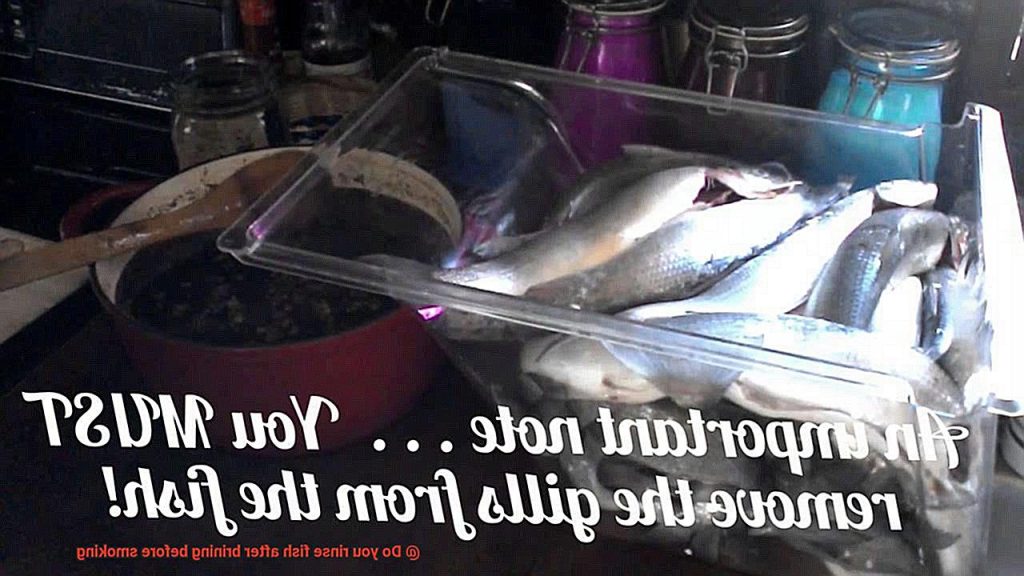Are you a seafood fanatic always in search of new and exhilarating ways to savor your favorite fish? Do you crave the succulent texture and smoky aroma of smoked fish, but are uncertain about rinsing it after brining before smoking? Fret not because this conundrum has puzzled many seafood enthusiasts, and today we’re going to delve into it in detail.
For centuries, smoked fish has been a delicacy relished by many. The amalgamation of salt, sugar, and smoke infuses the fish with flavor and grants it an exceptional texture that’s hard to resist. However, when it comes to brining and smoking fish, numerous techniques abound, leaving us wondering whether or not to rinse the fish after brining.
In this blog post, we’ll tackle this issue head-on and equip you with all the information needed to make an informed decision. We’ll explore the science behind brining and smoking fish, the various factors that impact the outcome, and expert-recommended best practices. So whether you’re a novice or seasoned pro at smoking fish, keep reading to find out if you should rinse your fish after brining before smoking.
Contents
What is Brining?
Brining is a culinary technique that has been used for centuries to elevate the flavor and tenderness of meat and fish. This process involves soaking the protein in a saltwater solution, often with additional herbs and spices, before cooking. The salt in the brine solution helps to break down the protein structure, allowing it to absorb more moisture and flavor. The result is a more juicy and flavorful end product that will leave your taste buds begging for more.
Brining can be done with various types of meat, including chicken, turkey, pork, and beef. However, it is also commonly used when preparing fish for smoking. When brining fish, it’s essential to use a mild solution that won’t overpower the delicate flavor of the fish. A typical fish brine solution would consist of water, salt, sugar, and perhaps some herbs or spices.
The length of time needed to brine fish will depend on the size and thickness of the fillets or whole fish. Small fillets may only need 30 minutes to an hour in the brine solution, while larger fish may require several hours. It’s best to experiment with different timings to find out what works best for you.
Once your fish has been brined, it’s crucial to rinse it thoroughly with cold water before smoking. This helps to remove any excess salt and prevent it from becoming too salty during smoking. Some people choose not to rinse their fish after brining so as not to wash away any of the flavor that the brine has imparted to the fish. Ultimately, whether or not to rinse your fish after brining is a matter of personal preference.
If you’re new to brining, don’t worry. It’s an easy technique that can take your dishes from good to great with just a little bit of effort. Here are some tips to help you get started:
- Use a non-reactive container when making your brine. Stainless steel, glass, and plastic are all good options.
- Don’t use too much salt. The general rule of thumb is one cup of salt per gallon of water.
- Add some sweetness to your brine. Sugar or honey can help balance out the saltiness while also adding flavor.
- Experiment with different herbs and spices to create a brine that’s uniquely yours.
Why is Brining Essential for Smoking Fish?
Before you start smoking, make sure you don’t skip the essential step of brining. Brining involves soaking the fish in a saltwater solution with herbs and spices for several hours before smoking it. But why is brining so crucial? Let’s take a closer look.
Firstly, brining enhances the flavor and texture of the fish. The salt in the brine breaks down the muscle fibers in the fish, making it more tender and juicy. Plus, it allows the fish to absorb other flavors that you add to the brine, such as herbs, spices, or even sugar. So, if you want your smoked fish to be bursting with flavor, brining is a must.
Secondly, brining removes any excess moisture from the fish. Excess moisture can cause the fish to become too dry during the smoking process, resulting in a less appetizing final product. By removing excess moisture, you can ensure that your smoked fish remains moist and tender.
But wait, there’s more. Brining also prevents bacteria growth. Smoking fish at low temperatures can create an ideal environment for bacteria to thrive, but the salt in the brine inhibits their growth. This is especially vital if you plan to store your smoked fish for any length of time.
In summary, brining is an essential step in preparing fish for smoking. Here are some key takeaways:
- Brining enhances flavor and texture.
- Brining removes excess moisture.
- Brining prevents bacteria growth.
Do You Need to Rinse the Fish After Brining?
Brining is a crucial step when it comes to smoking fish. It helps to ensure that your fish is moist and packed with flavor. However, once the brining process is over, the question arises: do you need to rinse your fish before smoking it?
The answer isn’t straightforward. Some experts suggest rinsing your fish after brining to remove any excess salt or impurities that may have gathered during the brining process. This can prevent your fish from becoming too salty or developing a bitter taste.
On the other hand, some experts advise against rinsing your fish after brining, as this can eliminate some of the flavors and moisture that have been infused into the fish during the brining process. Rinsing can also wash away any added spices or seasonings in the brine.
So, what should you do? It ultimately comes down to personal preference. If you prefer a milder flavor and are concerned about excess salt, rinsing your fish may be a wise decision. However, if you want to maximize the flavor and moisture of your smoked fish, then skipping the rinse may be a better option.
To help you make an informed decision, here are some pros and cons of rinsing your fish after brining:

Pros:
- Remove excess salt: Rinsing your fish can help remove any excess salt that may have accumulated during the brining process.
- Eliminate impurities: Rinsing can also get rid of any impurities that may have clung to your fish during the brining process.
- Prevent bitterness: Certain types of fish can develop a bitter taste if they’re not rinsed after brining. Rinsing can help prevent this from happening and ensure that your smoked fish tastes delicious.
Cons:
- Remove flavor: The whole point of brining is to infuse flavor and moisture into your fish. Rinsing it afterward can wash away some of this flavor, leaving you with a milder-tasting product.
- Dry out your fish: Rinsing can also remove moisture from your fish, which can lead to a dry final product. This is especially true if you don’t pat your fish dry before smoking it.
If you do decide to rinse your fish after brining, be sure to do so thoroughly under cold running water. Pat the fish dry with paper towels before smoking it to prevent excess moisture from affecting the smoking process.
Pros and Cons of Rinsing the Fish After Brining

Brining fish before smoking it is an excellent way to infuse flavor and moisture into your seafood. But, once you’ve brined your fish, the question remains: to rinse or not to rinse? Let’s explore the pros and cons of rinsing your fish after brining.
Firstly, rinsing your fish after brining can remove any excess salt that may have accumulated on the surface during the brining process. This is particularly important for delicate fish such as salmon, which can become over-salted if not rinsed correctly. Furthermore, rinsing can help improve the texture of the fish by removing any slimy residue that may have formed on the surface during brining.
However, some argue that rinsing can wash away essential flavor and moisture, which are vital elements for a delicious and tender final product. The salt in the brine helps lock in moisture and flavor, and rinsing may undo all of that hard work. Additionally, if you don’t rinse your fish thoroughly enough, it may still taste too salty, which defeats the purpose of rinsing in the first place.
Ultimately, the decision to rinse your fish after brining depends on personal preference. It may also depend on factors such as the type of fish being used and the specific brine recipe being used. If you choose to rinse your fish after brining, make sure to do so thoroughly with cold water and pat dry with paper towels before smoking to ensure a tasty and moist final product.
To summarize, here are the pros and cons of rinsing your fish after brining:
Pros:
- Removes excess salt
- Improves texture by removing slimy residue
Cons:
How to Properly Rinse the Fish After Brining
Brining is a crucial step in smoking fish, but it’s equally important to rinse the fish properly after brining to get rid of any excess salt and other flavors. Here are some simple steps for properly rinsing your fish after brining:
Step 1: Remove the Fish from the Brine Solution
After your fish has been brined for the desired amount of time, remove it from the brine solution and place it in a colander or strainer.
Step 2: Rinse Under Cold Running Water
Rinse the fish under cold running water for at least five minutes, ensuring that you rinse both the inside and outside of the fish thoroughly. This will help to remove any excess salt or brine solution that may have penetrated the fish.
Step 3: Pat Dry with Paper Towels
Pat the fish dry with paper towels or a clean kitchen towel to remove any excess water. This will prepare the fish for smoking and ensure that it doesn’t become too moist during the smoking process.
Step 4: Air Dry (Optional)
Some recipes may require air-drying the fish after rinsing to remove any excess moisture. If your recipe calls for air-drying, place the fish on a wire rack and let it sit in a cool, dry place for at least 30 minutes. This will help to ensure that the fish smokes evenly.
Step 5: Season (Optional)
If your recipe calls for seasoning, be sure to follow the specific instructions carefully. Some recipes may call for seasoning with a dry rub after rinsing, which can add additional flavor to your smoked fish.
Tips for Keeping Your Fish Moist and Flavorful After Rinsing
Smoking fish is an art that requires patience, skill, and a few tricks up your sleeve. One of the biggest challenges when smoking fish is keeping it moist and flavorful after rinsing. However, with the following tips, you can ensure that your smoked fish is not only perfectly seasoned but also juicy and delicious.
Pat the Fish Dry
After rinsing your fish, use a paper towel to pat it dry. This will remove any excess moisture and prevent the fish from becoming too waterlogged. By patting it dry, you create a tacky surface that helps the smoke adhere to the fish.
Use a Dry Rub
Using a dry rub is another excellent way to add flavor and moisture to your fish. A dry rub is a mixture of herbs and spices that is rubbed onto the surface of the fish before smoking. The rub helps to seal in the moisture and flavor of the fish, making it juicy and tasty.
Use a Basting Sauce
Basting your fish with a sauce during smoking is an excellent way to keep it moist and flavorful. A basting sauce can be made from various ingredients such as olive oil, lemon juice, garlic, and herbs. Brush the sauce onto the fish every 30 minutes while smoking to add moisture and flavor to your fish while preventing it from drying out.
Use a Smoker Box
Using a smoker box is another great way to add flavor and moisture to your smoked fish. A smoker box is a small metal box filled with wood chips that are placed on top of the fire source in your smoker. The wood chips release smoke into the smoker, adding flavor and moisture to the fish.
Check the Temperature
Finally, make sure not to overcook your fish. Overcooking can cause it to become dry and tough. The ideal temperature for smoked fish is around 145°F, so use a meat thermometer to check the temperature of the fish and remove it from the smoker as soon as it reaches this temperature.
Alternatives to Rinsing the Fish After Brining
Fret not, as there are numerous alternatives that will still result in scrumptious and flavorsome fish.
One option is air drying the fish after brining. Simply place the fish on a wire rack or clean surface and let it dry in a cool, dry place for several hours. This allows excess moisture to evaporate, resulting in a firmer texture and more concentrated flavor. Make sure the fish is entirely dry before smoking to ensure proper smoke adherence and prevent steam instead of smoke.
Another alternative is gently rinsing the fish with cold water and patting it dry with paper towels. This removes any excess salt from the surface of the fish without washing away all of the flavor from the brine. But be cautious when rinsing and avoid letting the fish soak in water for too long.
Alternatively, skip brining altogether and use a dry rub or marinade for flavoring. While this may not yield as moist or flavorful of a finished product as brining, it’s an excellent option for those who want to dodge any potential rinsing or drying issues.
sqLw0dVwwM0″ >
Conclusion
In the world of culinary arts, brining and smoking fish is a delicate process that requires patience, skill, and attention to detail. The question of whether or not to rinse your fish after brining before smoking has been a point of debate among seafood enthusiasts for years. Some experts argue that rinsing the fish removes excess salt and impurities, while others caution against it as it may wash away essential flavor and moisture. Ultimately, the decision to rinse your fish after brining comes down to personal preference.
To ensure that your smoked fish remains moist and flavorful after rinsing, there are several tips you can follow. For starters, patting the fish dry with paper towels helps remove any excess moisture without stripping away the flavor. Additionally, using a dry rub or basting sauce can add an extra layer of flavor while keeping the fish juicy. Lastly, monitoring the temperature during smoking ensures that your fish is cooked to perfection.
If you prefer not to rinse your fish after brining, there are still plenty of options available. Air drying or using a dry rub or marinade are all excellent alternatives that help lock in flavor while removing excess moisture.
Regardless of which method you choose, remember that brining is an essential step in preparing fish for smoking. It enhances both texture and taste while preventing bacteria growth.






